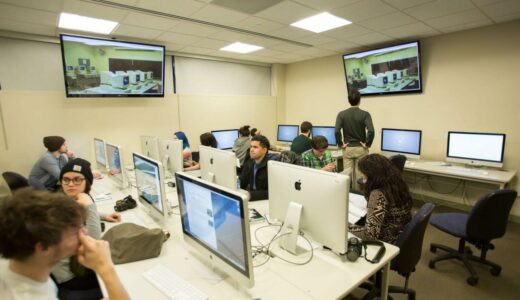CALL FOR APPLICATIONS: WISE ACCELERATOR
EDITORIAL OVERVIEW – ISSUE 20


Victoria Greene is a passionate digital consultant and advocate of digital transformation…done right. You can read more of her work on her blog, ‘Victoria E-commerce’.
Improvements in technology continue to offer incredible opportunities for the world of education. These improvements have ensured that the average college or university has smart projectors, tablets, computers, and software that students just a decade ago could only have dreamed about.
At the same time, the onrush of digital engagement has also proved to be effective at dividing attention and preventing the focus so essential to the learning process. It’s clear that, like many promising phenomena, technological advancement is a double-edged sword. So how is it helping future generations, how is it hindering them, and how can we go about embracing it with minimal negatives?
Let’s take a look at these questions.

Technology is expanding our horizons…
Even the most creative of students have always been limited in their thinking and activities by the frameworks and resources with which they are provided. How much aptitude has gone to waste over the centuries as a result of people never being introduced to tools and topics that would have captivated them?
The advent of access to the internet, however, brought with it an immense expansion in scope. In today’s world, anyone can satiate their curiosity through nothing more than a handful of keystrokes and the press of a button. The implications for study are overwhelming. No longer are young adults limited to the information and perspectives of required textbooks or particular teachers. They have true freedom to explore new ideas and avenues, to find the fields that suit them and learn exactly how to best pursue them.
Seen someone play a lute and wonder how you can give it a try? One search later, you’re heading for a site offering all the tips and resources you’ll need to pick it up. You don’t need to consult anyone else to begin with. There’s no great barrier to entry.
Want to apply what you’ve learned and go straight into running your own business? You don’t need a team of venture capitalists backing and advising you; you can set up your own store online. Anything you don’t know along the way, you can find out through some basic research, all without leaving your laptop.
It seems likely that, harnessed correctly, democratising access to knowledge is a process with the potential to offer revolutionary positives. And the technology not only connects students to the world, but also to each other in ways that can foster international collaboration, global thinking, and cross-border friendships. Of course, every rose has its thorn, as we’ll see next.
…But overwhelming our capabilities
How many times per day does the average person check their phone? [Editor’s Note: It’s obviously difficult to conduct research that can be universalized here, but estimates include 2,617 with an upper bound of over 500o; c. 150 mobile sessions a day, or nearly ten per waking hour; and 10,000 phone checks per year, or 28 each day]
There’s social media (Facebook, Twitter, Instagram, Snapchat), countless messaging apps, mobile browsing, games, apps, and other things besides, all generating a flood of insistent notifications that beg to be checked, assessed, and negotiated as appropriate.
And with the rise of VR and AR, the former with the potential to provide disconcertingly-realistic environments and the latter already beginning to change how we look at the formerly-offline world, the digital noise is only going to grow.
This can be damaging enough to the productivity and mental health of a world-weary adult, but add it to the traditional stresses of a young mind in a state of flux (the prefrontal cortex, vital for consistent reasoning, may not fully develop until the age of 25) and you have a recipe for disaster. Growing up with technology may teach you how to use it, but it doesn’t teach you how to analyse the information it yields.
Ultimately, unrestricted technology can easily have deleterious effects on adolescent students. [Editor’s Note: We were fortunate enough to encounter Baroness Kidron at EdTechX Europe 2017 and BETT 2018, who has made it her business to ensure that the digital world is transparent and empowering for young people. We also recommend the insights offered by Jean M. Twenge, researcher on generational differences at San Diego State University] Too much, too loud, too soon. And even if they could process it, it remains the case that having too many options can be as bad as having none at all if you have no meaningful way of filtering them, which is particularly threatening at a point in life when very important decisions are made.
This is why we need to be extremely careful with how technology is wielded in educational facilities. The breadth of the internet needs to be managed and contextualized, as students will invariably suffer from a total lack of supervision and direction. It isn’t nearly enough to give them tools and sit back.
Getting the right balance
This isn’t the first technological revolution that humanity has undergone, and the capacity for destruction possessed by new technology has proved fixating since time immemorial. In Greek myth, Prometheus gifts fire to humanity. Was this a good idea in the short term? How many early cities burned to a crisp as a result of ignorance? Do you suppose he took the time to warn them about what it could do?
This is a rather dramatic comparison, yes, but the underlying point is that technology carries with it certain risks. [Editor’s Note: We recommend Nick Bostrom’s ‘Superintelligence’ and Calum Chace’s ‘Surviving AI’ for those interested in deeper academic discussion of these risks]
Limited AI is expected to enter the educational mainstream within three to four years at this point, and while catastrophic outcomes remain improbable, educators and edtech entrepreneurs should be prepared to face interesting questions about what exactly the educational process will consist of, say, ten years from now.
Will students have their courses run and performance analyzed and assessed by algorithms? How much of the educational process will be absorbed by automation, and who will be tasked with identifying when and how it goes wrong? [Editor’s Note: It seems inevitable that these processes will occur, and are already occurring to some extent – the automation of assessment has been long ongoing, and an increasing number of ICT Tools are designed – as anyone attending BETT will attest – to incorporate learning algorithms]
These choices remain to be made, but they need to be communicated as openly as possible. The more processes get consumed by technology, the more opaque they tend to become, and methodological transparency will only become more important.
Ultimately, there’s really no compelling reason to fear the ever-accelerating rate of technological advancement, and it’s adding so much to the world of education. We need only be aware of the potential pitfalls so that we can make sure it never overwhelms us. Development or disruption? Let’s make sure it remains the former.

